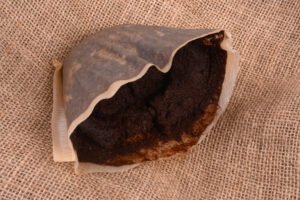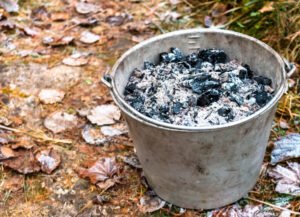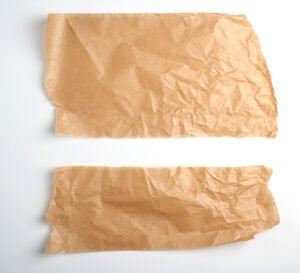There is a common misconception that pine needles acidify the soil. But did you know they’re a good carbon source and help structure the soil? That’s why pine needles are also commonly used as organic mulch. But can you compost pine needles? If so, then how?
Key Takeaways
- Pine needles can be composted as they are rich in carbon and condition the soil by adding nutritious humus.
- Since they break down slowly, it’s best to compost pine needles using the Hot Composting method, which is detailed in the steps below.
- Pine needles are acidic, so they must be composted in moderation. There are many more crucial tips waiting for you below!
- One of the many benefits of using them in compost is that they help improve the soil’s water retention capacity.
Hence, if you’re convinced to compost pine needles, let us learn the right method and tips to do so!
How to Compost Pine Needles?
Pine needles are a great source of organic material. They are considered brown feedstock and add structure to your compost pile.
As pine needles are acidic and take time to degrade, hot composting is the ideal method to compost them. It is an aerobic composting method that needs the vigorous action of microbes to break up the materials into humus.
For hot composting, you need to balance nitrogen (green materials), carbon (brown materials), oxygen (air), and moisture (water).

Follow this step-by-step guide to compost pine needles effectively through hot composting.
Step 1. Set Up Your Compost Pile/ Bin
You can use any old plastic bucket or container for composting after drilling holes across it. Place the bin in a sunny spot in your garden.
Step 2. Shred the Pine Needles
The second important step is to chop the pine needles into small pieces. This increases the surface area of the needles and makes them easy for the microbes to act upon, aiding in faster decomposition.
Step 3. Add Pine Needles to the Bin
Start adding pine needles and make a nice layer at the bottom of the bin. After that, water the layer until it’s adequately wet.
You can also mix other brown materials like dry leaves and other yard waste with pine needles. Generally, dry oak leaves are mixed with pine straw for composting.
Pine needles decompose slowly, so make sure to only limit their amount to 10 percent of the whole compost pile.
Step 4. Add Green Materials
Now, add a layer of Nitrogen-rich materials like grass clippings, fruits, and vegetable waste, coffee grounds, eggshells, and other kitchen waste.
Greens will break down faster than needles, keeping the pine straw intact. So it is recommended to add green materials once in a while.
Step 5. Repeat the Layers
Alter the brown and green layers until you have finished all the composting materials. Then seal the pile with a thick layer of pine needles at the top. Finally, water it.
Step 6. Maintain Your Compost Pile
Check the moisture levels regularly and water the compost pile to carry out microbial action. You also need to turn the pile twice a week. This ensures aeration and keeps the temperature high in a pile.
Your finished compost will be ready for your vegetable garden or flower bed within two months. When the compost is ready, it will turn brownish with an earthy smell.
Can You Add Pine Needles to a Wormbin?

It is not recommended to compost pine needles through vermicomposting for several reasons.
Firstly, Conifers contain high concentrations of terpenes and hexane that are toxic, and worms are sensitive to these hydrocarbons.
Furthermore, the waxy cuticle and dry cellulose of the pine needles make them difficult for worms to chew. Lastly, the acidic nature of the pine needle keeps the worms away.
However, if these needles are pre-digested in the compost bin, they can be added to a worm bin.
Do Pine Needles Really Make the Compost Acidic?
There is a notion that, being acidic, pine needles are not ideal for composting. Although the pH of fresh pine needles is indeed between 3.2 and 3.8, they lose their acidity once detached from the tree, fall down, and start decomposing.
So, the best practice is to leave the pine needles as the natural mulch once they fall off the pine tree and later add them to compost. This will reduce their pH, making them neutral.
Furthermore, even if you add fresh needles to the compost bin, the microbial action will turn the finished compost neutral. But it reduces the decomposition rate as the pine needles’ acidic nature may adversely affect fungi and bacteria in a pile.
In a nutshell, the acidity of the pine needles remains on the soil surface and does not have a major impact. So it is safe to compost pine needles without worrying that they will alter the soil pH and make it acidic or unsafe.
Benefits of Composting Pine Needles
While many people mistake pine needles as harmful to soil and plants, they actually come with several benefits. Here are a few benefits you need to consider for composting them:
- Pine needles do not compact and promote aeration in your compost bin.
- Pine needles add carbon and structure to your compost.
- They help with moisture retention in the compost pile.
- Pine needle compost helps plants tolerate drought and other adverse conditions.
- They provide organic material to the soil and help in plant growth.
- It is economical and saves you from buying costly fertilizers.
How to Compost Pine Needles Faster?
Pine needles take their sweet time decomposing due to the wax coating and low pH. So, here are a few methods that will help you cut down the decomposition time.

1. Use Pre-Digested Pine Needles: Use the pine needles as an organic mulch for one season to let them decompose naturally. You can also leave the pine straw under the tree to act as tree protection.
Another option is to pile the fallen pine needles to allow them to decompose naturally with the help of sun and rain. As the needles break down, the wax cuticle will decompose too, and they will be good to go to the compost bin.
The pre-digested pine needles decompose quickly in about six weeks when added to the compost bin.
2. Shred the Pine Needles Before Composting: Like other composting materials, pine needles also break down faster when used as small pieces. You can chop them using a garden shredder or wood chipper before composting.
You can also make a heap of pine needles and run a lawnmower to shred them finely. The smaller the needles, the better.
3. Soak Them in Water: Break the pine needles into pieces and soak them for 24-48 hours. Generally, the waxy cuticle in the needles does not absorb the water and delays the decomposition.
When soaked in water, the dampness of the needles attracts microbes to act upon them, increasing the breakdown speed.
Additional Tips for Composting Pine Needles
Pine needles are a great supplement to the soil, but while composting them, you need to be careful as they are acidic in nature and slow to decompose. So here are a few tips for you to compost pine needles effortlessly:
- Pine needles break down slowly, so limit their use in your compost pile. The recommended portion of pine needles in the compost is up to 10%.
- Using dry pine needles that are already used as organic mulch is best for composting as they break down quickly.
- Soak pine needles in water for 24 hours for quick results.
- Pine needles should always be composted with a good amount of greens and browns.
- If you consider composting large quantities of pine needles, compost them separately.
- Avoid using needles from the roadside as they might contain heavy metals. Also, do not use the needles having dog droppings.
Mulching with Pine Needles
The pine needles interlock and stay intact. This makes it a good mulch option for acid-loving plants like rhododendrons, raspberries, strawberries, and vegetable crops like carrot, cucumber, sweet peppers, pumpkin, and tomato plants.
To make the pine mulch, spread a 4 -inch layer of pine straw around the trees and shrubs. Shake and toss the needles as you spread them to make the straw fluffy.

Here are some of the benefits of using pine needles as mulch:
- Pine needles are light in weight, reduce manual labor to mulch your garden, and are considered better than heavy wood mulch or bark mulch.
- They inhibit weed growth by blocking the sunlight from reaching the ground.
- Pine straw mulch decomposes slowly, and you need not replace the mulch regularly, saving your time and energy. Once decomposed, they enrich the soil.
- They insulate the soil by protecting it from high temperatures in summers and freezing in winter.
- Pine needles prevent erosion from heavy rainfalls, and once they settle on the ground, they do not blow out with wind easily.
How long does it take for pine needles to decompose naturally?
Pine needles break down slowly, taking up to 1-2 years to decompose entirely if left on the ground. But they can break down within 1-2 months through hot composting.
Is pine mulch good for a vegetable garden?
Pine mulch is a great addition to your vegetable garden as they help in water retention and controlling weeds. Moreover, it increases soil acidity while breaking down, and most vegetable plants grow well in acidic soil.
Should pine needles be left on the ground?
Leaving the fallen pine needles under the pine tree is an excellent idea as it serves as a mulch and nourishes the tree. When the pine needles start to break down, they shed their waxy coating, and when added to your compost bin, the needles decompose quickly.
What to do with dead pine needles?
You can use pine needles as an organic mulch, a fire starter, a room freshener, or a disinfectant. In addition, you can brew a refreshing pine tea or have a warm footbath with these needles. They also have medicinal properties and control cough and congestion.
Are pine needles good for the garden?
Pine needles are organic waste and add nutrients to your plants through mulch and compost once they decompose. In addition, they help in aeration and increase soil porosity. So pine straw is a great option to supplement your garden.
Can you compost fresh pine needles?
It is recommended to leave the fresh pine needles on the ground or use them as mulch for acid-loving plants. This makes the fresh needles lose their acidity and break the wax coating. If fresh needles are used in compost, they may reduce the pH of the compost initially and delay the decomposition process.
Can you use pine cones in compost?
Yes, pine cones can be added to your compost but make sure to break them into smaller pieces before adding your pine cones to the compost. This makes them easy to break down.
Why do pine needles decompose slowly?
Pine needles have a waxy coating or cuticle, which repels water and slows down the decomposition. Also, the low pH of pine needles inhibits the action of microbes and delays the decomposition process.
If you have a pine tree in your backyard, you know how to use the needles falling from it now. Pine needles are an excellent addition to your garden and compost if used with care. So stop worrying about how to discard this organic waste and try to make the best of it.
Happy Composting!








